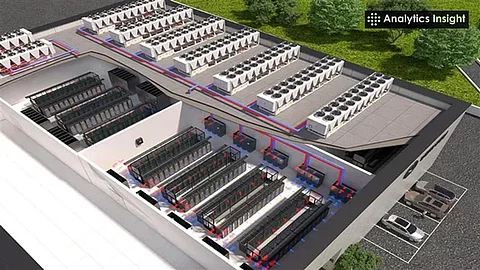

The United Kingdom government is planning to establish a large artificial intelligence data center in the disputed Teesworks area of northeast England. Government ministers describe this location as an emerging "AI Growth Zone," which is part of a national initiative aimed at enhancing the country's AI ecosystem.
If approved, the Teesworks complex would become the largest in Europe, covering approximately 500,000 square meters. Major tech companies, including Microsoft, DeepMind, Anthropic, and Google, have reportedly shown interest in the project.
However, the AI expansion is intensifying tensions between government ministries. The Department for Science, Innovation and Technology (DSIT) is spearheading the drive on AI growth. The Department for Energy Security and Net Zero (DESNZ), led by Ed Miliband, voiced alarm over the energy and water usage of gigantic data centers.
“There would be a much more advanced AI agenda if it weren’t for Miliband’s net zero fixation,” a DSIT official said to the Financial Times, describing deep divisions within Whitehall between climate policy and tech growth.
The Teesworks development, like most big data centers, will require substantial amounts of electricity and cooling water, prompting concerns similar to those raised by the first AI Growth Zone in Oxfordshire, which has seen water shortages become a top priority.
The new data centre also places the UK’s climate goals in a dilemma. The data centre is situated directly on top of a blue hydrogen and carbon capture scheme that BP proposed to anchor the region’s clean industrial future. Teesworks Ltd and the South Tees Development Corporation have opposed BP’s proposal, stating that it would hinder the construction of the data centre.
Energy Secretary Ed Miliband now has to make up his mind by August 28. He must decide whether to sign off on BP’s Development Consent Order (DCO), including compulsory purchase rights over some of the same land.
Also Read: How Artificial Intelligence is Driving the Future of Biocomputing?
The site is itself clouded with controversy over governance. In April 2025, Deputy Prime Minister Angela Rayner issued a “best value” notice to the Tees Valley Combined Authority (TVCA) following a series of criticisms of a £1-per-acre land transfer deal, which transferred 90% of Teesworks Ltd into the hands of private developers Chris Musgrave and Martin Corney.
Despite the launch of an oversight ‘improvement board,’ critics argue the project reflects deeper structural issues around public-private partnerships and transparency in large-scale tech infrastructure.
